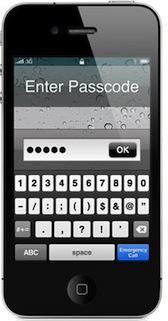iPhone 4 and iOS 4 Expected to Drive Increased Demand for iPhones in the Workplace; More Than Half of iPhone Owners Will Increasingly Use It to Conduct Work; More Than a Third of non-iPhone Owners Will Consider Purchasing One for Business
With today’s launch of Apple’s iPhone 4 and the release of iOS 4 software earlier this week, demand for iPhone integration and access to enterprise networks is expected to grow significantly.
Several new features in the iPhone 4 are making the iPhone a viable business tool and are expected to drive adoption of iPhone use in the workplace.
According to a recent study commissioned by Sybase (NYSE:SY), over half of respondents who currently own an iPhone said that the new features of iOS 4 will cause them to use their iPhone for work purposes more often. Additionally, more than a third of respondents who are not currently iPhone owners, said they would consider purchasing one for work purposes based on the new features of both iOS 4 and iPhone 4.
With the iOS 4 update, several new features designed to improve the functionality of iPhones for business include the ability to sort email conversations by subject, multi-task between applications, and the ability to install company-related applications without the need to physically connect to a computer and use iTunes.
Security in iPhone 4 and iOS 4
An important factor that limited previous generation iPhones from being widely adopted in the enterprise has been security. Apple now has added several key security functions into the iPhone 4 and iOS 4.
iPhones now have the ability to remotely wipe sensitive information from the device in the event it has been lost or stolen, a feature BlackBerry has had for many years and something IT departments and security-savvy users have been demanding since the original iPhone.

Other new security features in iOS 4 and iPhone 4 include new data protection and encryption functions, as well as mobile device management and SSL VPN support.
In addition to the new functions coming from Apple to support iPhones in the enterprise, many third parties have released solutions specifically designed to help deploy, manage and secure iPhones and iPads in enterprise environments.
While the new iPhone includes several new functions and features designed to make enterprise integration more attractive, companies still have concerns over supporting new devices on their networks, in particular, employee owned devices such as the iPhone.
The Sybase survey showed that where employers do provide them with a mobile device, more than half claim they would ask their company to upgrade to an iPhone based on the new features of either iPhone 4 or iOS 4.
Kevin Kilroy, Director of Information Risk at Starwood Hotels & Resorts, sees the benefits but also has concerns about allowing employee owned iPhones on its corporate network. “We realize that as the workforce becomes dominated by generation x, y, z, their work and their consumer life merge. In order to attract and retain good talent, we need to respond to the consumerism trend in the enterprise,” said Kilroy.
“At the same time, we need to figure out our level of tolerance for company data and issues that arise with an associate’s device that may lead the loss of company data or create an unacceptable liability on the company,” Kilroy said.
Kilroy also noted that concerns should not just be on the side of the employer. “When attaching a mobile device to the corporate network, the employee gives up something too, because the company can access data and retains the right to remotely wipe the device.”
Starwood Hotels and Resorts currently only supports company issued BlackBerries in its infrastructure, but is feeling the pressure from associates wanting to user their own devices including the iPhone.
Evolution of Usage Habits as iPhone Gains Traction for Business Use
The Sybase survey results show that consumers are increasingly using the iPhone for work-related tasks:
• More than half (64 percent) of iPhone owners use the device at least once a week for work-related tasks. The most common work related task conducted by users with mobile phones was making business-related phone calls, while the most common task for iPhone users was checking work email.
• More respondents (20 percent) use individually chosen business applications they have downloaded from the iTunes App Store versus using company supported business applications (13 percent). This demonstrates an increased opportunity for companies to harness the new capabilities of iOS 4 through custom-built enterprise applications that mobilize business processes.
• Approximately 56 percent of iPhone users surveyed were likely to use the device for work purposes more often with the new features, spurring a renewed emphasis on iPhone use for business purposes.
• More than a third of survey respondents who don’t currently own an iPhone and whose employers don’t provide them with a mobile phone, said they would consider purchasing one if new business-ready features became readily available.
The study, conducted by Zogby International for Sybase, polled over 2,000 people in the United States and explored increasing demand for iPhones in the workplace, most anticipated iPhone and iOS features for conducting work, and work-related usage habits between iPhone users and non-iPhone users.
What are your thoughts and company policies on employee owned iPhones and mobile devices in the workplace? Please comment below...












